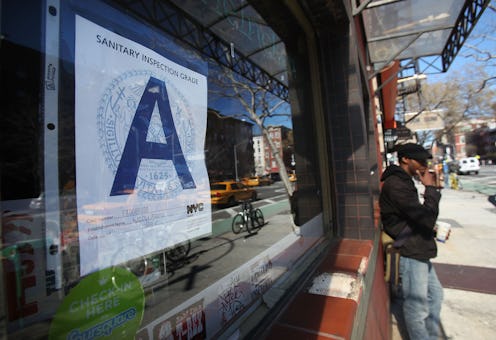News
NYC Is Using Your Yelp Reviews For This
The latest way authorities are using social networks to track down the bad guys? Well, if by bad guys you mean "cockroaches," New York City food safety officials are using Yelp to investigating food poisoning in the city's restaurants. The state's Department of Health published a report Friday about their breakthrough.
Since its founding in 2004, Yelp has exploded into an urban guide on everything. But restaurants are easily the most popular business reviewed on Yelp, and virtually any restaurant you can think of comes with honest and sometimes brutal write-ups. Naturally, if someone gets sick after eating at a restaurant, they'll take to Yelp to warn others. What they don't do, however, as the health department discovered, is report the illness to the city. Who thinks to call the health department when they get sick?
"While investigating an outbreak of gastrointestinal disease associated with a restaurant, the New York City Department of Health and Mental Hygiene noted that patrons had reported illnesses on the business review website Yelp that had not been reported to DOHMH," the study authors wrote in the Centers For Disease Control and Prevention's weekly report.
Thus came the department's idea to join forces with Yelp. From July 2012 to March 2013, the review site sent the health department weekly roundups of their reviews, and approximately 294,000 were analyzed in total. Of that total, a software program flagged 893 cases that required further examination, and then of those cases 499 were identified as containing content related to food-borne illness (keywords like "diarrhea" and "vomit" were very helpful, apparently). Ultimately the study narrowed down the results to 27 people, who were then interviewed over the telephone.
"From those 27 interviews, three previously unreported restaurant-related outbreaks linked to 16 illnesses met DOHMH outbreak investigation criteria," the authors wrote in their report. "Environmental investigation of the three restaurants identified multiple food-handling violations."
And what did those 16 people eat that made them sick? The house salad; shrimp and lobster cannelloni; and macaroni and cheese spring rolls at three different restaurants that the report does not name. Here's an idea: if you see mac 'n' cheese spring rolls on a menu, just don't.
According to Dr. Sharon Balter, one of the study authors, the biggest factors leading to food-borne illness are bare hand contact with food and cross-contamination in storage spaces and the fridge, like raw meat on ready-to-eat food. The health department plans to continue its collaboration with Yelp, as the symbiotic relationship has yielded successful results and could lead to less food poisoning for New Yorkers.
"We’re ... providing a two-way street for the data: Alert environmental health inspectors when an outbreak occurs while providing the latest inspection information to diners," Luther Lowe, Yelp's director of government affairs, told the New York Times . "Our partnership could lead to a dramatic reduction in food-borne illness."
In the near future, every city could have its own comprehensive online database or registry for food poisoning, but for now, get to know the foods and restaurant signs that are most likely to better acquaint you with your toilet.
The Most Contaminated Foods, According to the Center For Science in the Public Interest
- Leafy greens like spinach, lettuce, and arugula
- Eggs — because salmonella
- Tuna, which according to the CSPI, is the third-most contaminated food
- Oysters, especially raw ones (Noooooo!)
- Potatoes, which can cause both salmonella and E. coli
- Cheese, especially unpasteurized and raw milk cheeses
- Tomatoes, which can be contaminated at any point from planting to manufacturing
- Raw sprouts — don't be fooled by their harmless, nutritious demeanor!
- Berries, especially strawberries and raspberries, which can cause cyclospora infection, an illness of the intestines
- Meat and poultry — if your meat ever looks undercooked, don't be afraid to send it back
Things to Watch Out For at a Restaurant
- The general cleanliness of the restaurant, bathroom, and wait staff is a good indication for the cleanliness of the kitchen
- The daily special is often comprised of old ingredients the chef needs to get rid of, which often includes fish and meat
- Restaurant lemons are usually filthy, so try to avoid them
- Buffets and salad bars are breeding grounds for bacteria, so also avoid those
- Beware the salsa and guac (they're often made in large batches and sit out all day)
- Never order fish on a Monday (it's likely the chef bought it for the Saturday night rush and now it's two days old)
- Again, don't be afraid to send anything back if it looks off
